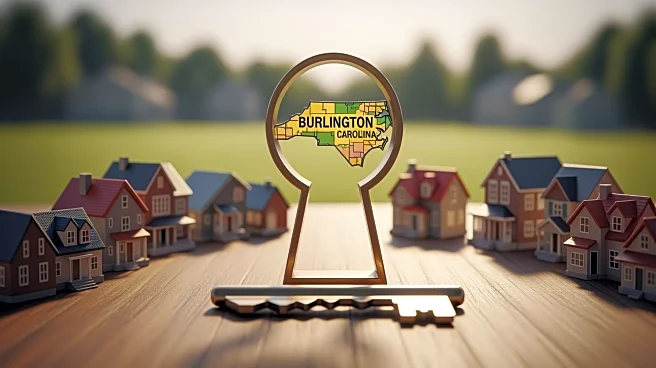What's Happening?
A recent analysis of cross-market demand data from Realtor.com reveals that Burlington, North Carolina is attracting interest from homebuyers in major metropolitan areas across the United States. The scarcity
of homes on the market nationwide, which remains below pre-pandemic levels, has kept prices elevated despite a slowdown in sales over the past year. This trend has led to increased online house hunting, with 97% of homebuyers utilizing online platforms according to a 2021 National Association of Realtors report. The data highlights significant interest from cities such as Atlanta, New York, and Washington, D.C., with Atlanta leading the view share at 13.4%. Other notable metros include Durham, Greensboro, and Charlotte in North Carolina, as well as Charleston and Greenville in South Carolina.
Why It's Important?
The interest in Burlington, North Carolina from major metropolitan areas underscores a broader trend in the U.S. housing market where buyers are seeking more affordable and less congested living environments. This shift could have significant implications for local economies in smaller cities like Burlington, potentially driving up property values and stimulating local businesses. For larger cities, this trend may indicate a potential easing of housing demand pressures, which could influence urban planning and development strategies. The movement of homebuyers from high-cost areas to more affordable regions may also impact demographic patterns and the distribution of economic activity across the country.
What's Next?
As the housing market continues to evolve, Burlington and similar cities may experience increased demand for infrastructure and services to accommodate new residents. Local governments might need to consider strategic planning to manage growth sustainably, including investments in transportation, education, and healthcare facilities. Real estate developers could see opportunities for new housing projects, while existing homeowners might benefit from increased property values. Additionally, the trend could prompt policymakers in larger cities to address affordability issues to retain residents and maintain economic vibrancy.
Beyond the Headlines
The migration of homebuyers to Burlington reflects broader societal shifts, including the desire for improved quality of life and remote work flexibility. This trend may also highlight disparities in housing affordability and access, prompting discussions on equitable housing policies. The movement could influence cultural dynamics in receiving communities, fostering diversity and potentially reshaping local identities. Long-term, these shifts might contribute to a reimagining of urban and suburban landscapes in the U.S., with implications for environmental sustainability and community resilience.









